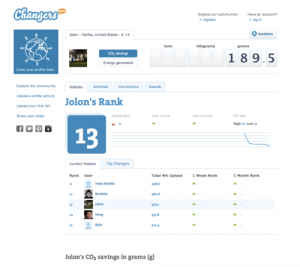Does gameful solar power pay off?
Imagine you could produce your own electricity, charge the batteries of your electronic devices and even get rewarded. The German startup Changers tries to make that true. They designed a solar power charger for USB devices and a software that helps to produce your own electricity. By calculating the saved amount of CO2 and rewarding high savings Changers tries to sensitize people to lead a carbon free, sustainable lifestyle.
The concept behind Changers is known as gamification. The consultancy company Gartner defines it as follows:
Gamification uses game mechanics and game design techniques in non-gaming context – it’s a […] tool to engage employees, customers and the public to change behaviors, develop skills and drive innovation.“ (Gartner 2014, n. pag.)
Game mechanics may comprise the receiving of points and achievements (level-ups) or the sharing and comparing of personal performance with a community (Dale 2014, 82ff.). Changers went through ups and downs with its gamification concept. After stagnating business numbers the startup had to raise 1.5 million dollars to fuel business again. Even if success did not come so far investors believe in the concept. Reason enough to look how Changers works and how it tries to make use of gamification.
The Changers package consists of a hardware part called “Changer Starter Kit” and a software. The Changer Starter Kit comprises a solar panel and a smart battery that is applicable to all devices that can be charged via USB. The solar panel transforms sunlight into energy which can be stored in the battery. And this is where gamification starts.
The battery allows to store and calculate the energy currently produced as well as the amount of energy produced all over the year and corresponding CO2 savings. Then users connect the battery to their PC and upload those figures to the Changers software. Finally they share their figures with the Changers community or via Twitter, getting ranked and collect badges that can be exchanged with services like free car sharing rides or even holiday trips.
Given the struggles in the past it is justified to ask if this concept works? But firstly, it is necessary to take a look at the scientific discourse about gamification. Hamari, Koivisto and Sarsa mapped the findings in this research field. According to them the majority of studies analyzed if game elements could create more enjoyable exercise experiences and motivate users (Hamari, Koivisto, Sarsa 2014, 3). Most studies found at least some positive effects on motivation such as increased joy to learn (Hamari, Koivisto, Sarsa 2014, 4).
Additionally, Hamari and Koivisto did own research on gamification focussing on demographic differences. Women, for instance, perceived acknowledgement in social networks more positively than men. Interaction in a community could therefore affect the motivation of women positively (Hamari, Koivisto 2014, 183). Usefulness is another motivator to increase exercise intensity and performance (Hamari, Koivisto 2014, 183). Yet, Hamari and Koivisto could not find gender differences in terms of perceived usefulness. Negative effects are possible as well. A long-term use of gameful applications seems to decrease the perceived usefullness and enjoyment of men and women alike (Hamari, Koivisto 2014, 183).
What do those findings imply for Changers? Given the price of $149, it is likely that most customers buy a Changer Starter Kit not necessarily for reasons of acknowledgement or joy but for reasons of usefulness. The use of a portable solar power charger is to enable users to charge their devices independently from plugs and to produce carbon free solar power. Hence the motivation of Changers´ customers might stem from that clearly defined use maybe coupled with an awareness for environmental issues. Sharing figures about CO2 savings and receiving social acknowledgement or rewards is indeed an interesting way to sensitize people for ecological issues. But the urge to charge batteries that run down in a certain rhythm seems to be the main reason to use the Starter Kit. Finally, those gameful aspects seem to be rather redundant than to be a fully fledged motivator to produce own energy.
To conclude, the gamification concept behind Changers seems like a fancy add-on with limited motivational effects. The Changer Starter Kit is a product with a special use for a special customer and does not depend on gameful elements. The fact that the Changers Starter Kit is a niche product at a high price might explain the best why success did not come so far.
References and further reading
Butcher, Mike. „Changers Relaunches Out of Insolvency To Take On Japan“ Techcrunch. 2012. AOL inc. 12. September 2014. http://techcrunch.com/2012/07/13/changers-relaunches-out-of-insolvency-to-take-on-japan/
Butcher, Mike. „Changers Raises $1.5M To Turn Charging Your Phone Via The Sun Into An Infectious Game“ Techcrunch. 2014. AOL inc. 12. September 2014. http://techcrunch.com/2014/02/21/changers-raises-1-5m-to-turn-charging-your-phone-via-the-sun-into-an-infectious-game/
Changers. 2014. Blacksquared GmbH. 9. September 2014. http://www.changers.com/
Dale, Steve. “Gamification: Making work fun or making fun of work?” In: Business Information Review. Vol. 31 pp. 82-90. SAGE, 2014.
Hamari, Juho; Koivisto, Jonna. “Demographic differences in perceived benefits from gamification.” In: Computers in Human Behavior. Vol. 35 pp. 179–188. Elsevier Ltd., 2014
Hamari, Juho; Koivisto, Jonna; Sarsa, Harri. “Does Gamification Work? – A Literature Review of Empirical Studies on Gamification.” In: Proceedings of the 47th Hawaii International Conference on System Sciences, Hawaii, USA, January 6-9, 2014.
Montgomery, Kelly. „Changers Solar Charger kit offers rewards to sun-capturing members“ Digital Trends. 2011. Designtechnica corp. 12. September 2014. http://www.digitaltrends.com/home/changers-solar-charger-kit-offers-rewards-to-sun-capturing-members/
No author. „Gamification: engagement strategies for business and IT“. Gartner. 2014. Gartner Inc. 11. September. http://www.gartner.com/technology/research/gamification/


